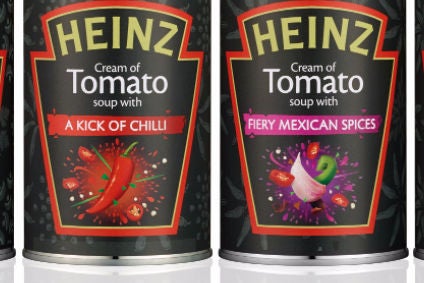It’s fair to say Kraft Heinz’s stock-exchange announcement after the closing bell in New York on Thursday raised eyebrows.
But the real surprise lay in the detail rather than the thrust of the announcement.
The magnitude of the US$15.4bn write-down on certain reporting units – including its US refrigerated portfolio and its Canadian retail business – and on certain intangible assets, primarily the Kraft and Oscar Mayer trademarks, startled investors.
The news Kraft Heinz received a subpoena in October from the US Securities and Exchange Commission on an investigation into the company’s procurement also caught the eye.
Kraft Heinz’s fourth-quarter profits did miss Wall Street expectations, while analysts covering the business were also disappointed by the company’s outlook for 2019.
But, some analysts say, there have been concerns about the long-term efficacy of the strategy of Kraft Heinz and its owners Berkshire Hathaway and 3G Capital.

US Tariffs are shifting - will you react or anticipate?
Don’t let policy changes catch you off guard. Stay proactive with real-time data and expert analysis.
By GlobalData“Investors for years have asked if 3G’s extreme belt-tightening model ultimately would result in brand equity erosion,” JPMorgan analyst Ken Goldman was quoted as saying by Reuters on Friday.
But now questions are naturally being more widely asked about that strategy – and rightly so.
3G Capital has shaken up swathes of the food and beverage sectors in recent years. Its modus operandi has been built on M&A and then driving synergies from the transactions to grow margins.
The strategy was seen in the global brewing industry through the consolidation spearheaded by 3G-backed Anheuser-Busch InBev. Then, through first the acquisition of H.J. Heinz in 2013 and the merger of that business with Kraft Foods Group, the 3G play-book was used – with Berkshire Hathaway’s backing – in packaged food, too.
The margin improvement at Kraft Heinz has been strong – its annual operating profit margin rose from 15.1% in 2014 to 23.5% in 2017 – and has in recent years prompted almost all listed majors to take long, hard looks at their own cost base. The merger of Kraft and Heinz and the introduction of zero-based budgeting and other aggressive cost-control measures undoubtedly moved the needle on margin expectations. Many US food manufacturers fell into line, adopting what has commonly become known as the “3G model”.
However, the question about Kraft Heinz has always been about its long-term growth. Savings can only go so far in boosting margins. Over time, sustainable sales growth is needed, too. And Kraft Heinz has not been able (or, some would say, willing through investment in its brands) to consistently grow its top line, either on a reported or an organic basis.
Kraft Heinz’s management has, in recent quarters, sought to emphasise the work the company was putting in to try to grow its sales. On a reported basis, Kraft Heinz’s net sales grew 0.7% to $26.26bn in 2018. On an organic basis, net sales inched up 0.8%. In the fourth quarter of the year, Kraft Heinz’s sales grew 2.4% on an organic basis.
“Our model is working,” Kraft Heinz CEO Bernardo Hees insisted as he spoke to analysts after the announcement.
Nevertheless, in the wake of Thursday’s announcement, the market is unconvinced. “All said, while a challenging industry backdrop is likely partly to blame, frankly, we believe some of Kraft Heinz’s issues are distinct,” Barclays analyst Andrew Lazar wrote on Friday.
It is clear the fabled 3G equation of M&A plus synergies equalling profits and returns to investors has not proved the right recipe for Kraft Heinz in what is a rapidly-evolving packaged-food market.
As well as the 3G strategic play-book, consider Kraft Heinz’s stable of brands. The ketchup, baked beans and soup maker is a business laden with centre-store, legacy brands facing a squeeze from, one side, the rise of private label in its home market and, on the other, in the US and in a number of markets around the world, the growing popularity of smaller, more agile, on-trend insurgent brands appealing to more promiscuous, less brand loyal consumers.
Speaking to CNBC today, Berkshire Hathaway founder Warren Buffett said he had “was wrong in a couple of ways on Kraft Heinz”, saying he over-paid for the business and that he “misjudged the retail versus brand fight,” with private labels gaining at the expense of some brands.
Analysts reporting back from last week’s Consumer Analyst Group of New York investment conference in Florida – at which many of Kraft Heinz’s peers presented – have spoken about how one of the common themes to emerge from the strategies of companies speaking at the event was a focus on growth and, while savings are still being pursued, the accent, for the year at least, is on reinvesting those savings.
What now for Kraft Heinz? Market sentiment is low, as evidenced by the slide in the company’s share price on Friday and another – albeit much smaller – decline today.
“We now worry that the company’s visibility into future financial performance is limited and that it will take quite some time for management to rebuild credibility with investors,” Sanford Bernstein analyst Alexia Howard wrote today. “While Kraft Heinz delivered volume growth in Q4, the expected improvement in profit trends failed to materialize and the company expects further profit pressures in 2019 based on higher-than-expected costs. Kraft Heinz’s apparent limited visibility into its profit outlook is concerning.”
Speaking to analysts on Thursday, Kraft Heinz indicated it would likely turn to the disposal of assets to try to improve its growth prospects (and boost its balance sheet). Yesterday (24 February), news outlet CNBC, citing people familiar with the matter, said Kraft Heinz had hired investment bank Credit Suisse to review options for its Maxwell House coffee business, including a potential sale.
Could the Planters snack-nuts business be another candidate? Last year, Kraft Heinz sold its Canadian natural cheese business; could its US cheese business be another candidate for sale?





